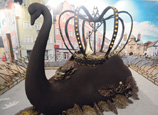
"It may sound absurd to young people today like you, but for businessmen at that time, it was important to keep workers happy and loyal, especially those experienced craftsmen who were difficult and costly to train," Yao says.
"My father treated them like family members and cared for their needs. In return, they worked hard and the company expanded quickly. His wood was sold all over the country and some eve house n overseas to East Asian countries."
Yao has also become a businessman and had always wanted to be one like his father, but "the times changed and I couldn't copy what he did."
The Yao house was a famous "mansion" in the area that was mostly populated by small vendors and canal laborers. The parents and grandparents of many people who live on this street were involved in the canal business, from ship building and loading cargoes, to selling food and supplies.
In renovating the street, the local government has retained the original layout and appearance. The interiors were renovated and modernized, but on the outside they still look like old-time stores.
Residents were relocated to temporary housing in 2008 during the renovation, but were given the option of returning when the street reopened in the summer of 2009.
The new houses were built according to the style of the old times, but the interiors are brand new, with modern toilets and plumbing. The streets have a modern drainage system.
"Hangzhou already has one UNESCO heritage landscape site, the West Lake, and now we are applying for UNESCO status for the Grand Canal, along with many cities," says architect Huang Zi, an expert member of the UNESCO bidding committee. He is also a researcher at the Traditional Architecture Design Institute of Zhejiang Province.
"The history of the West Lake was filled with upper-class intellectuals and government officials, who lived by the lake, sailed on the lake, painted the lake and created poems that glorified the lake and made it famous," Huang tells Shanghai Daily. "It represented a sophisticated and casual lifestyle."
By contrast, the Grand Canal is quite the opposite, he says. "It encapsulates how lower-class workers and small vendors lived and worked. And the lives of both intellectuals and laborers were part of Hangzhou's history and culture."

















 Beauties at Beijing Film Academy enrollment site
Beauties at Beijing Film Academy enrollment site


![]()
